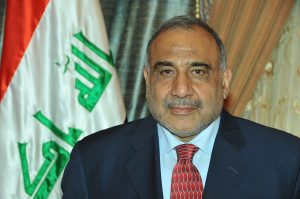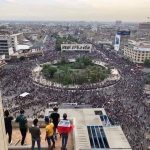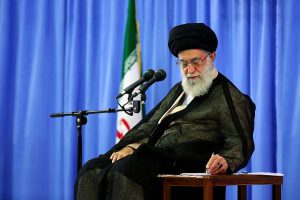If there is a single takeaway from the thirteen years of “crippling sanctions” against Iraq, it’s that the program didn’t work. Neocons and their allies — who pushed for a full invasion in the first Gulf War — were declaring as much in 1998, by which time they were already calling for blood. Eventually, they got their wish, and mired the U.S. — not to mention Iraq and the broader Middle East — in the ensuing disaster.
But are there more instructive lessons to take away from the experience of the 1990s and early 2000s, when Iraq was under blockade with the ostensible aim of keeping weapons out of Saddam Hussien’s hands? (Does this sound familiar yet?) Andrew Cockburn’s essay in the July 22 London Review of Books is a good place to start.
Some of the facts throughout his review of Joy Gordon’s book, “Invisible War: The United States and the Iraq Sanctions,” will be new to many people. For instance, Yemen, which had a seat on the security council, had all their U.S. aid cut three days after casting a ‘no’ vote to UN sanctions. And some reatlities from the 1990s are so startling that Cockburn only serves to remind: Infant mortality in Iraq rising from 1 in 30, in 1990, to 1 in 8, in 1997.
The U.S. initially imposed sanctions on Iraq while Saddam’s army was still exploring Kuwait. At the time, writes Cockburn:
Iraqi sanctions were popular at first among the liberal-minded because they appeared to offer an alternative to war. As the Bush administration’s determination to go to war became clearer, allowing sanctions ‘time to work’ became a rallying cry for the peace party.
Sanctions, however, didn’t work in the early 1990s, and Iraq was invaded. Saddam was pushed back to his own border with Kuwait, and no farther. Neocons, riding high at the “end of history,” pushed for a full invasion, but lost out to realists in the George H.W. Bush administration.
But Bush continued sanctions against Iraq, officially waiting to confirm that Saddam didn’t have those elusive “weapons of mass destruction.” In short order, however, Bush established that sanctions were aimed at regime change. Cockburn digs up a quote from then-deputy national security adviser and now-Secretary of Defense Robert Gates, which confirmed Bush’s shift:
“Saddam is discredited and cannot be redeemed. His leadership will never be accepted by the world community. Therefore,” Gates continued, “Iraqis will pay the price while he remains in power. All possible sanctions will be maintained until he is gone.”
Within a few years, everything from salt, to paint, to kids bikes were banned from entering Iraq. A humanitarian crisis unfolded, and there was Saddam Hussein, still on top. As Cockburn notes:
If the aim of such a comprehensive embargo had indeed been the dictator’s overthrow, its perpetrators might have pondered the fact that it was having the opposite effect. Saddam, whose invasion of Kuwait had led to the disaster, was now able to point to the outside powers as the source of Iraqis’ suffering.
Now, here’s an important point: The set-up for the second Gulf War came out of a Democratic presidency, where soon-to-be Secretary of State Madeline Albright said that the death of Iraqi children was “worth it,” a quote Cockburn usurps for the title of his essay. It was Albright who, at that top diplomatic post a year later, announced that the U.S. opposed weapons inspectors who wanted to declare Iraq in compliance with International demands on its weapons programs.
Take it away, Cockburn:
This provoked an escalating series of confrontations between the UNSCOM team and Iraqi security officials, ending in the expulsion of the inspectors, claims that Saddam was “refusing to disarm,” and, ultimately, war.
…[T]he West should think carefully before once again deploying the ‘perfect instrument’ of a blockade.





Dr Rafil Dhafir is paying the price for helping get aid to starving Iraqi civilians during the brutal embargo. For sending aid through his charity Help the Needy, he is sentenced to 22 years. Please let others know about his case:
http://www.dhafirtrial.net/case-summary/